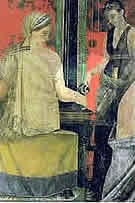| |||||||||||||||||||||||||||||||||
| Facts > Pagan Ideas > Dying and Rising Gods | ||||
| Start here > | Slavery | Dreams | Demons | Soul | God | Heaven |
| Hell | Miracles | Prophecy | Eternal Life | Divine men | Godmen | |
| Virgin Birth | Phony quotes | Secret | Logos | Monotheism | Ethics | |
| Angels | Sacrifice | Baptism | Eucharist | Stuff we forgot | Mystery Religions | |
| Dying and Rising Gods | Raised from Dead | Savior | ||||
| Dying and rising Gods, remnant of the Mythic Jesus theory |
 
You can't read much about Christianity and Paganism without coming
across Dying and Rising Gods. |
|
Dying and Rising Gods scholarship
This stuff really got going back in the late 1800s, as part of a wider
movement when a guy named James Frazer came out with
a book called (Sir Jimmy had such a good time writing this thing that decades later he was still putting out updated versions; one is thirteen volumes long. If you're buying a used copy be careful—it's hard not to get the various version and volume numbers confused.) Frazer's idea was that all the way back to the third millennium BC, ancient middle eastern cultures had a "dying and rising God" cookie cutter they used to bake up new Gods, especially "vegetation Gods" that died and rejuvenated with the food growing seasons. Now, it's just the next paragraph and you've already cottoned to the same idea everyone else did when they read the Golden Bough: maybe that well known ancient middle eastern God Jesus was just cut cookie number forty seven. You won't be surprised to learn that not everyone was happy to hear Frazer's theory, and that ever since people have been arguing if Jimmy had things straight. Did Jimmy have things straight? Do much reading and you're bound to come across how modern scholarship has thrown over the tired old idea of "dying and rising Gods." Must we, sigh apologists, go on about these tired old theories—scholars don't believe them, why should you? |


 The
Golden Bough Studies in Magic and Religion , which pointed
out that in the ancient near east Gods like Osiris,
Tammuz and the early middle eastern version of Adonis,
had all died and been resurrected.
The
Golden Bough Studies in Magic and Religion , which pointed
out that in the ancient near east Gods like Osiris,
Tammuz and the early middle eastern version of Adonis,
had all died and been resurrected.